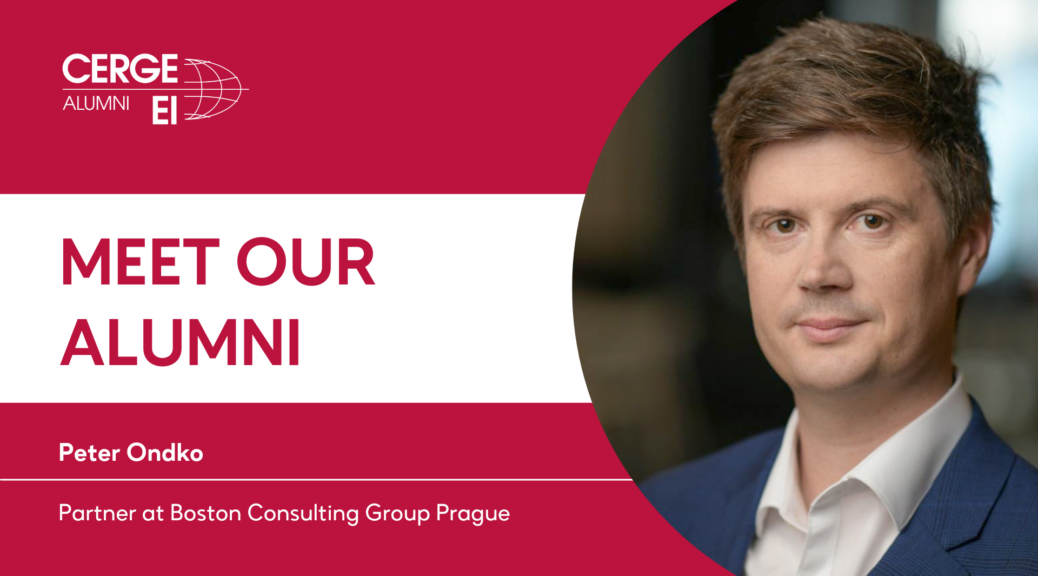Peter Ondko, a CERGE-EI 2013 PhD in Economics graduate, has been recently promoted to Partner at Boston Consulting Group Prague. What does he like most about working in consultancy and what challenges does he see in the energy industry he specializes in? Read more in our blog.
Congratulations on becoming Partner at BCG Prague. Can you tell us more about your career path?
Thank you. I decided to try management consulting around the time I finished my PhD thesis. My primary motivation simply was to try something different. It turned out I really liked the nature of the work and consulting became my career. Within consulting, the career progression is clearly defined – associate to consultant to project leader to partner – following a well-known “up-or-out” logic. As I progressed along this path over the past 10 years, my work tended to gravitate more and more towards the energy industry. Within energy, I had an opportunity to work on major utility transformations, operational, efficiency improvements, energy regulations, and national electrification programs. The regional footprint of the work has been diverse too including Europe, Middle East, Southeast Asia, and Australia.
What do you like the most about working in consultancy?
Three things. First, the people. People in my teams are smart, motivated, and caring. I really value being part of this ‘bubble’. Second, intellectual challenges. Problems I had been working on have been often intellectually challenging while at the same time solutions had to be practical and impactful. Finally, the approach to work. Problem solving in consulting is hypothesis driven, interactive, fast and 80/20 oriented on what matters. This keeps the work relevant and quickly progressing, which I find deeply satisfying.
What from your CERGE-EI studies has influenced you the most in your career?
It’s not surprising that consulting is much less about elegant theory or rigorous empirical evidence as in academia. But even though I didn’t really leverage the full depth core of micro/macro/econometrics learned at CERGE-EI, I really leveraged some of the skills CERGE-EI instilled, most notably the structured approach to problem solving, capability to challenge logical argumentation, and clarity in written and spoken communication. These are skills that are foundational for many career paths in business and I am greatly thankful to CERGE-EI for giving me the space to improve. I had a chance to shine on a case once for being able to develop a multi-factor regression model to forecast electricity consumption in R in a matter of days.
In your work, you focus on energy industry and regulation, a common topic in recent months. What are the biggest challenges you see in the field?
This is a big topic right now and there’s no simple answer to do it justice. Energy has for a long time been considered a traditional and almost sleepy, industry practice in consulting. This has started to change with the push for transition towards an environmentally sustainable energy system, accelerated as long neglected issues of energy security have become a priority. The areas where most of the thinking is concentrated on these days cover topics such as decarbonizing existing power generation fleets, transition from natural gas towards alternatives including green fuels such as green hydrogen, integrating intermittent renewables to energy systems at scale and incentivizing customers for energy efficiency and demand response. The priorities differ among regions with change dynamics being highest in Europe. Getting through the energy crisis here will require actions that will shape the energy system and probably also market designs for the long-term.
Do you have any recommendations for the near future regarding energy industry?
My first advice would be to involve more mainstream economists in debate. Incentive structures in energy markets are not trivial and careful, systematic thinking about implications of policy changes is required, which is unfortunately not always in place. In turbulent times of fundamental policy proposals incoming on an almost weekly basis, properly trained economists can contribute high value.
For the society, my advice would be to start paying more attention and be more active regarding choices pertaining to energy. We grew accustomed to having energy available at the flick of a switch typically for relatively flat tariffs. In the coming future, the cost of energy will likely stay significantly elevated and only active choices can help us manage our bills.
What is the strongest message CERGE-EI gives to its students?
I’m not sure if it is still the same, but the message I took with me from my studies was, “Strive for excellence in whatever you do.”
